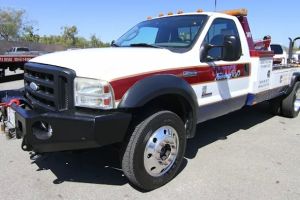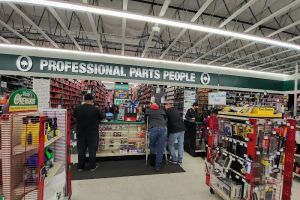How to Call for Towing When Stranded on the Highway: A Step-by-Step Guide
Being stranded on the side of the highway is a stressful and unnerving experience. Whether your car breaks down unexpectedly, runs out of gas, or experiences a flat tire, the first thing you need to do is stay calm and take the right steps to ensure both your safety and your car’s safe removal. I’ve been in this situation myself, and knowing how to call for towing properly made all the difference. In this guide, I’ll walk you through the important steps to take when you find yourself stranded and need towing assistance on the highway.

United Towing Service Inc.
26170 Adams Ave, Murrieta, CA 92562, USA
1. Ensure Your Safety First
The first priority when you find yourself stranded is your safety. I learned this the hard way, during a road trip when my car suddenly broke down on a busy highway. Before you even think about calling for towing, make sure you’re in a safe spot. Here are a few steps to follow:
- Pull Over to the Shoulder: If possible, steer your car to the shoulder of the road or an off-ramp. This is especially important on highways with fast-moving traffic. I always try to park as far off the road as possible to avoid accidents.
- Turn On Hazard Lights: Turn on your hazard lights immediately to alert other drivers that you’re having car trouble. This simple step helps prevent accidents, especially at night or during bad weather.
- Stay Inside Your Vehicle: If you're on a busy highway, it’s safer to stay inside your car while you wait for help. If you need to exit your car, do so carefully and remain on the side of the road, away from moving traffic.
2. Assess the Situation
Once you're safe, try to assess the situation and determine what the problem is. Understanding the cause of the breakdown can help you explain the situation more clearly when you call for towing. Here are some things to check:
- Check for Flat Tires: One of the most common causes of breakdowns is a flat tire. If you have a spare tire and the tools to change it, you can try to fix it yourself, as long as you’re in a safe spot.
- Check for Engine Issues: If the engine is smoking or there are warning lights on the dashboard, this could be a sign of more serious mechanical issues. In my case, I once noticed a temperature warning light on the dashboard, which signaled an overheating problem. That’s when I knew I needed towing help.
- Consider Fuel Levels: It’s embarrassing, but it happens to the best of us. Running out of fuel is a common cause of being stranded on the highway. Make sure you check your fuel gauge before calling for help.
3. Gather Your Information
When you call for towing, having all the necessary information ready will make the process smoother and faster. Before dialing the towing company, I make sure I have the following details:
- Your Exact Location: Knowing your exact location is crucial. If you’re not sure, try to look for mile markers, exit signs, or street names. Many GPS apps also offer “share location” features that can help pinpoint where you are.
- Car Details: Be ready to provide your car’s make, model, and color. Towing companies often ask for this information to send the right type of tow truck.
- Reason for Breakdown: While it’s not always clear why your car stopped working, try to provide the best description you can. For example, you might say “my engine overheated” or “I ran out of gas.” This will help the towing service prepare for your specific situation.
4. Call for Towing Assistance
Once you have the necessary information, it’s time to call for towing. Here’s how to make the process go smoothly:
- Find a Reliable Towing Service: Make sure you’re calling a reputable towing company. I always prefer to use a service that I’ve researched or one recommended by friends or family. Some companies also offer roadside assistance, so if you’re a member of an auto club or insurance service, you may be able to contact them for towing assistance.
- Give Accurate Information: When the dispatcher answers, stay calm and give them all the details they need. Be clear about your location, car details, and the problem you’re facing. This will help them send the right equipment and ensure the fastest response.
- Ask About Timing and Costs: Once you’ve provided the necessary details, ask how long the tow will take to arrive and inquire about the cost. Knowing what to expect can help reduce stress while you wait. When I’ve been stranded, I always ask for an estimated arrival time and any upfront costs so there are no surprises later.
5. Wait Safely for Help
While waiting for the tow truck, it’s important to remain calm and patient. I always make sure my car is parked safely and that I’ve moved as far away from traffic as possible. If you can, stay in your vehicle with the doors locked. If the weather is cold or hot, make sure to stay comfortable and hydrated. Most importantly, never attempt to fix the car yourself unless you’re trained to do so. In my experience, trying to repair the car while stranded on the side of the highway can lead to more damage or even injury.

O'Reilly Auto Parts
1799 Story Rd, San Jose, CA 95122, USA
6. Prepare for the Tow
When the tow truck arrives, the driver will need to assess the situation. You’ll want to provide them with the necessary details and stay out of the way while they load your vehicle. Be sure to ask where your car will be taken and if there are any additional charges for special towing services. In some cases, you may need to sign paperwork or release the car to the towing company before they can take it away.
If you’re concerned about the towing process or have any questions, don’t hesitate to ask the driver for clarification. I’ve found that asking about what’s involved in the towing process helps ensure there are no misunderstandings.
7. Consider Roadside Assistance Plans
If you’re frequently on the road, you might want to consider signing up for a roadside assistance plan. These services provide 24/7 towing and a variety of other helpful services, such as tire changes, fuel delivery, and lockout assistance. I signed up for roadside assistance a few years ago, and it’s been a lifesaver during unexpected breakdowns. Many car insurance policies also include roadside assistance, so be sure to check if you’re already covered.
In conclusion, knowing how to call for towing when stranded on the highway can make a stressful situation much easier to manage. By following these steps—ensuring your safety, gathering key information, and contacting a reliable towing service—you can get the help you need quickly and efficiently. The next time you find yourself stranded, you’ll feel more confident in handling the situation and getting back on the road.




























